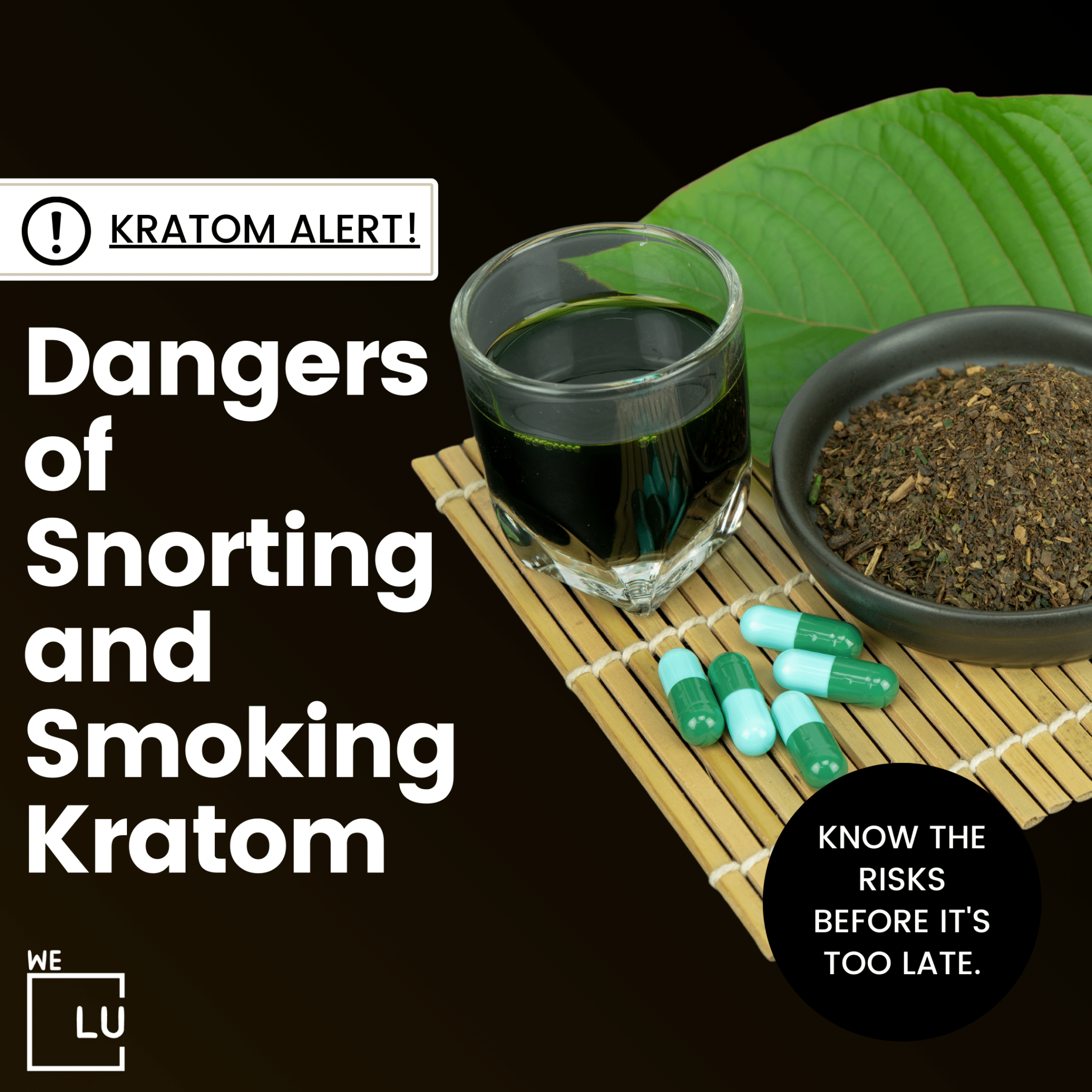Exploring the world of kratom can be an intriguing journey, as this herbal supplement is often praised for its potential benefits. However, we must navigate this landscape with awareness and understanding, especially regarding possible side effects. Learning about the nuanced aspects of kratom consumption can empower individuals to make informed decisions about their well-being. Read on to learn more about Kratom side effects.
If you or someone you know is grappling with kratom addiction, reach out to We Level Up CA for assistance and support on the path to recovery. Your well-being matters and help is just a call away.
What Is Kratom?
Kratom, scientifically known as Mitragyna speciosa, is a tropical evergreen tree native to Southeast Asia, particularly in Thailand, Indonesia, Malaysia, Myanmar, and Papua New Guinea. The leaves of the kratom tree have been traditionally used for centuries by indigenous people in the region for their stimulant and opioid-like effects.
Kratom contains active compounds called alkaloids, with mitragynine and 7-hydroxy mitragynine being the most prominent. These alkaloids interact with receptors in the brain, producing various effects depending on the dosage. In low to moderate doses, kratom is often reported to have stimulating effects similar to those of caffeine. At higher doses, it can have sedative and analgesic (pain-relieving) effects, similar to opioids.
How Is Kratom Used?
Kratom has gained popularity in some parts of the world as an herbal supplement, and it is sometimes used for self-medication or recreational purposes. However, its safety and efficacy are subjects of debate. The U.S. Food and Drug Administration (FDA) has raised concerns about the potential for abuse, addiction, and health risks associated with kratom use. The FDA has not approved kratom for any medical use, and the regulatory status of kratom varies in different countries.
Kratom Side Effects
While kratom has been used traditionally in Southeast Asia for many years, its safety and potential side effects are still a topic of ongoing research and debate. Individual reactions to kratom can vary, and the side effects may depend on factors such as dosage, frequency of use, and an individual’s overall health. Here are some potential side effects associated with kratom use:
- Nausea and Vomiting: Some users report experiencing nausea and vomiting, particularly at higher doses.
- Dizziness and Drowsiness: Kratom can cause dizziness and drowsiness, especially in higher amounts.
- Constipation: Kratom may lead to constipation as it affects the gastrointestinal system.
- Dry Mouth: Dehydration and dry mouth have been reported as common side effects.
- Loss of Appetite: Some individuals may experience a decrease in appetite.
- Sweating: Excessive sweating, particularly at higher doses, has been reported.
- Tremors or Jitters: In some cases, users have reported experiencing tremors or jitters.
- Mood Changes: Kratom can influence mood, and users may experience mood swings or irritability.
- Dependency and Withdrawal: There are reports of individuals developing dependence on kratom, leading to withdrawal symptoms when they try to stop using it. Withdrawal symptoms may include muscle aches, insomnia, irritability, and mood swings.
- Potential for Addiction: Some individuals may misuse kratom, leading to addiction. The addictive potential is a significant concern, and the long-term effects of regular use are not well understood.
- Interaction with Other Substances: Kratom can interact with other substances, including medications. Combining kratom with other substances, especially alcohol or drugs, can increase the risk of adverse reactions.
Short-Term Effects Of Kratom
The short-term effects of kratom can vary depending on the dosage, individual tolerance, and the specific strain of kratom used. In general, kratom is reported to produce stimulant-like effects at lower doses and sedative or opioid-like effects at higher doses. Here are some of the short-term effects associated with kratom use:
- Stimulation: At lower doses (usually 1-5 grams), kratom is often reported to produce increased energy, alertness, and sociability. Users may feel more focused and motivated.
- Euphoria: Some individuals report euphoria or a general well-being, especially at moderate doses.
- Analgesia (Pain Relief): Kratom has analgesic properties and is commonly used by some individuals for pain relief.
- Relaxation: At higher doses (usually 5 grams or more), kratom may induce a sense of calmness and relaxation. Some users experience a mild sedative effect.
- Enhanced Sociability: Users may feel more talkative and social under the influence of kratom.
- Mood Lift: Kratom is reported to have mood-enhancing effects, potentially alleviating symptoms of anxiety and depression in some users.
- Increased Alertness: Kratom may improve concentration and focus in some individuals.
- Appetite Suppression: Some users report a decrease in appetite while using kratom.
Long-Term Effects Of Kratom
Research on the long-term effects of kratom is limited, and the available evidence is not as extensive as it is for some other substances. Kratom has been used traditionally in Southeast Asia for many years, but the patterns and doses of use in traditional settings may differ from how it’s used in other parts of the world today. Here are some potential long-term effects associated with kratom use:
- Dependency and Addiction: There are reports of individuals developing dependence on kratom with regular use. This can lead to addiction, and users may experience cravings and compulsive drug-seeking behavior.
- Tolerance: With prolonged use, individuals may develop tolerance to the effects of kratom, requiring higher doses to achieve the desired effects. Tolerance can contribute to the risk of escalating use and potential dependence.
- Withdrawal Symptoms: Abrupt cessation of kratom use can lead to withdrawal symptoms, which may include muscle aches, insomnia, irritability, mood swings, runny nose, and gastrointestinal disturbances. The severity of withdrawal symptoms can vary among individuals.
- Gastrointestinal Issues: Long-term use of kratom has been associated with constipation and other gastrointestinal issues.
- Liver Toxicity: There have been reports of liver toxicity associated with kratom use. However, the exact relationship between kratom and liver damage is not fully understood and may be influenced by individual factors.
- Cognitive Effects: Some users have reported cognitive impairment with long-term use, including memory and concentration problems.
- Psychological Effects: Prolonged use of kratom has been associated with mood swings, anxiety, and potential exacerbation of pre-existing mental health conditions.
- Social Implications: Kratom use, particularly if it leads to dependence or addiction, can have social implications, affecting relationships, work, and overall functioning.

Kratom side effects may include nausea, dizziness, constipation, dry mouth, dependence, withdrawal symptoms, and potential liver and cardiovascular concerns.
Skip To:
Learn More:
- Kratom Side Effects Long-Term And Short-Term Side Effects.
- Is Kratom An Opioid? Can You Use Kratom For Opioid Withdrawal?
- Kratom Drug Addiction Overdose, Detox & Treatment
- What is the Most Addictive Drug? Top 10 Most Addictive Drugs, Cocaine, Heroin, Alcohol & More
- Dilaudid Vs Oxycodone, Which Is Better For Pain Management?
- Valium Side Effects. How Long Do The Effects Of Valium Last?

Get Your Life Back
Find Hope & Recovery. Get Safe Comfortable Detox, Addiction Rehab & Dual Diagnosis High-Quality Care.
Hotline (855) 695-1160
Kratom Effects On Liver
While kratom has been associated with liver-related issues in some cases, the evidence linking kratom use to liver problems is limited and not fully understood. Some individuals have reported adverse effects on the liver, ranging from mild symptoms to severe liver damage.
However, these cases are relatively rare, and many people use kratom without experiencing significant liver issues.
Here are some potential effects of kratom on the liver:
- Elevated Liver Enzymes: Some individuals have reported elevated liver enzymes, which can indicate liver inflammation or damage. Elevated liver enzymes are often discovered through blood tests.
- Jaundice: In more severe cases, users have reported symptoms of jaundice, characterized by yellowing of the skin and eyes. Jaundice is a sign of potential liver dysfunction.
- Abdominal Pain: Some individuals who have experienced liver-related issues attributed abdominal pain to their kratom use.
Get Help. Get Better. Get Your Life Back.
Searching for an Accredited Drug and Alcohol Rehab Centers in Near You?
Even if you have failed previously and relapsed, or are in the middle of a difficult crisis, we stand ready to support you. Our trusted behavioral health specialists will not give up on you. When you feel ready or just want someone to speak to about therapy alternatives to change your life call us. Even if we cannot assist you, we will lead you to wherever you can get support. There is no obligation. Call our hotline today.
FREE Addiction Hotline – Call 24/7Kratom Side Effects On The Heart
While kratom has been associated with various effects, the impact on the heart is not as well-studied, and the evidence is limited. Kratom contains alkaloids, including mitragynine and 7-hydroxy mitragynine, which can interact with receptors in the body and may influence cardiovascular function. Here are some potential cardiovascular side effects associated with kratom use:
- Increased Heart Rate (Tachycardia): Stimulant effects of kratom, especially at higher doses, may lead to an increase in heart rate. This is a common side effect reported by some users.
- Hypertension (High Blood Pressure): Kratom use has been associated with an increase in blood pressure, particularly at higher doses. Individuals with pre-existing hypertension may be more susceptible to these effects.
- Palpitations: Some users have reported experiencing palpitations, which are sensations of rapid, strong, or irregular heartbeats.
- Cardiotoxicity: There have been isolated reports of kratom use being linked to cardiotoxicity. However, the evidence is limited, and more research is needed to establish a clear link between kratom and heart-related issues.
If you have pre-existing cardiovascular conditions or concerns about the potential effects of kratom on your heart, it is advisable to consult with a healthcare professional. They can provide personalized advice based on your medical history and help you make informed decisions regarding the use of kratom or any other substances.
Research on the cardiovascular effects of kratom was limited, and ongoing studies were examining its safety profile. It’s recommended to check for updates from reputable sources or healthcare authorities for the latest information on kratom and its potential effects on the cardiovascular system.

Comfortable Facilities & Amenities
High-Quality Addiction & Mental Health Rehabilitation Treatment
Rehab Centers TourRenowned California Addiction Center. Serene Private Facilities. Inpatient rehab programs vary.
Addiction Helpline (855) 695-1160Proven recovery success experience, backed by a Team w/ History of:
15+
Years of Unified Experience
100s
5-Star Reviews Across Our Centers
10K
Recovery Success Stories Across Our Network
- Low Patient to Therapist Ratio
- Onsite Medical Detox Center
- Comprehensive Dual-Diagnosis Treatment
- Complimentary Family & Alumni Programs
- Coaching, Recovery & Personal Development Events

How Long Do The Effects Of Kratom Last?
The duration of kratom effects can vary depending on several factors, including the strain of kratom, the dosage, individual tolerance, and whether it’s taken on an empty or full stomach. In general, the effects of kratom are relatively short-lived compared to some other substances. Here’s a general guideline for the duration of kratom effects:
- Stimulant Effects (Low Doses): At lower doses (typically 1-5 grams), kratom tends to produce stimulant-like effects. These effects can last for about 2 to 4 hours.
- Sedative Effects (Higher Doses): At higher doses (usually 5 grams or more), kratom may have more sedative and analgesic effects. These effects may last for 4 to 6 hours or longer.
- Strain Variability: Different kratom strains (e.g., red, green, white) may have varying durations of effects. Red strains are often associated with more sedative effects, while white strains are considered more stimulating.
- Individual Variability: Individual responses to kratom can vary, and factors such as body weight, metabolism, and tolerance can influence how long the effects are felt.
- Tolerance Development: With regular use, some individuals may develop tolerance to the effects of kratom, which means they may require higher doses to achieve the same effects. Tolerance can also impact the duration of effects.
World-class, Accredited, 5-Star Reviewed, Effective Addiction & Mental Health Programs. Complete Behavioral Health Inpatient Rehab, Detox plus Co-occuring Disorders Therapy.
CALL (855) 695-1160End the Addiction Pain. End the Emotional Rollercoaster. Get Your Life Back. Start Drug, Alcohol & Dual Diagnosis Mental Health Treatment Now. Get Free No-obligation Guidance by Substance Abuse Specialists Who Understand Addiction & Mental Health Recovery & Know How to Help.
“Do The Next Right Thing” Addiction Treatment Quotes & Mental Health Self Care Quotes.
Experience Transformative Recovery at the We Level Up California Treatment Center.
See our authentic success stories. Get inspired. Get the help you deserve.



Start a New Life
Begin with a free call to an addiction & behavioral health treatment advisor. Learn more about our dual-diagnosis programs. The We Level Up treatment center network delivers recovery programs that vary by each treatment facility. Call to learn more.
- Personalized Care
- Caring Accountable Staff
- World-class Amenities
- Licensed & Accredited
- Renowned w/ 100s 5-Star Reviews
We’ll Call You
Search We Level Up CA Kratom Side Effects, Drug & Alcohol Rehab / Detox & Mental Health Topics & Resources
Sources
- Striley CW, Hoeflich CC, Viegas AT, Berkowitz LA, Matthews EG, Akin LP, Iheanyi-Okeahialam C, Mansoor U, McCurdy CR. Health Effects Associated With Kratom (Mitragyna speciosa) and Polysubstance Use: A Narrative Review. Subst Abuse. 2022 May 20;16:11782218221095873. doi: 10.1177/11782218221095873. PMID: 35645563; PMCID: PMC9130800. https://www.ncbi.nlm.nih.gov/pmc/articles/PMC9130800/
- NIDA. “Kratom.” National Institute on Drug Abuse, 25 Mar. 2022, https://nida.nih.gov/research-topics/kratom
- DEA – Kratom Drug Fact Sheet – https://www.dea.gov/sites/default/files/2020-06/Kratom-2020_0.pdf
- FDA – Kratom – https://www.fda.gov/news-events/public-health-focus/fda-and-kratom
- Jentsch MJ, Pippin MM. Kratom. [Updated 2023 Aug 28]. In: StatPearls [Internet]. Treasure Island (FL): StatPearls Publishing; 2023 Jan-. Available from: https://www.ncbi.nlm.nih.gov/books/NBK585120/
- Eastlack SC, Cornett EM, Kaye AD. Kratom-Pharmacology, Clinical Implications, and Outlook: A Comprehensive Review. Pain Ther. 2020 Jun;9(1):55-69. doi: 10.1007/s40122-020-00151-x. Epub 2020 Jan 28. PMID: 31994019; PMCID: PMC7203303. https://pubmed.ncbi.nlm.nih.gov/31994019/
- Boyer EW, Babu KM, Adkins JE, McCurdy CR, Halpern JH. Self-treatment of opioid withdrawal using kratom (Mitragynia speciosa korth). Addiction. 2008 Jun;103(6):1048-50. doi: 10.1111/j.1360-0443.2008.02209.x. PMID: 18482427; PMCID: PMC3670991. https://www.ncbi.nlm.nih.gov/pmc/articles/PMC3670991/https://www.ncbi.nlm.nih.gov/pmc/articles/PMC3670991/
- Singh D, Narayanan S, Vicknasingam B, Corazza O, Santacroce R, Roman-Urrestarazu A. Changing trends in the use of kratom (Mitragyna speciosa) in Southeast Asia. Hum Psychopharmacol. 2017 May;32(3). doi: 10.1002/hup.2582. Epub 2017 May 24. PMID: 28544011. https://pubmed.ncbi.nlm.nih.gov/28544011/
- Grundmann O, Veltri CA, Morcos D, Knightes D 3rd, Smith KE, Singh D, Corazza O, Cinosi E, Martinotti G, Walsh Z, Swogger MT. Exploring the self-reported motivations of kratom (Mitragyna speciosa Korth.) use: a cross-sectional investigation. Am J Drug Alcohol Abuse. 2022 Jul 4;48(4):433-444. doi: 10.1080/00952990.2022.2041026. Epub 2022 Apr 7. PMID: 35389321.https://pubmed.ncbi.nlm.nih.gov/35389321/
- Papadi G, Bakhiya N, Ildico Hirsch-Ernst K. Assessment of the possible health risks associated with the consumption of botanical preparations of Mitragyna speciosa (kratom). EFSA J. 2022 May 25;20(Suppl 1):e200415. doi: 10.2903/j.efsa.2022.e200415. PMID: 35634550; PMCID: PMC9131591. https://pubmed.ncbi.nlm.nih.gov/35634550/
- Singh D, Müller CP, Vicknasingam BK, Mansor SM. Social Functioning of Kratom (Mitragyna speciosa) Users in Malaysia. J Psychoactive Drugs. 2015 Apr-Jun;47(2):125-31. doi: 10.1080/02791072.2015.1012610. PMID: 25950592. https://pubmed.ncbi.nlm.nih.gov/25950592/




